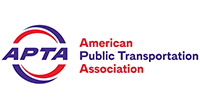| The Honorable Susan M. Collins Chairman Subcommittee on Transportation, HUD, and Related Agencies Committee on Appropriations U.S. Senate 184 Dirksen Senate Office Building Washington, DC 20510 |
The Honorable David E. Price Chairman Subcommittee on Transportation, HUD, and Related Agencies Committee on Appropriations U.S. House of Representatives 2358A Rayburn House Office Building Washington, DC 20515 |
| The Honorable Jack Reed Ranking Member Subcommittee on Transportation, HUD, and Related Agencies Committee on Appropriations U.S. Senate 125 Hart Senate Office Building Washington, DC 20510 |
The Honorable Mario Diaz-Balart Ranking Member Subcommittee on Transportation, HUD, and Related Agencies Committee on Appropriations U.S. House of Representatives 1016 Longworth House Office Building Washington, DC 20515 |
Dear Chairman Collins, Ranking Member Reed, Chairman Price, and Ranking Member Diaz-Balart:
On behalf of the American Public Transportation Association (APTA), which represents a $71 billion industry that directly employs 430,000 people and supports millions of private-sector jobs, I write to thank you for your efforts to advance the Transportation, Housing and Urban Development, and Related Agencies Appropriations Act, 2020 (H.R. 3055, Division E) (“THUD Appropriations bill”).
As you begin discussions on resolving the differences between the House and Senate THUD Appropriations bills, we urge you to provide the highest possible level of funding for public transportation and passenger rail investments. Specifically, we urge you to provide at least $13.48 billion for Federal Transit Administration (FTA) programs and $2.7 billion for Federal Railroad Administration (FRA) passenger rail grants, as provided by the House THUD Appropriations bill. These critical funds will help improve public transit and passenger rail service, safety, and capacity, while chipping away at the more than $90 billion backlog of transit state-of-good-repair infrastructure projects.
The THUD Appropriations bills provide significant funding increases for Buses and Bus Facilities formula and competitive grants, State of Good Repair grants, and Rural formula grants above levels authorized in the Fixing America’s Surface Transportation Act (FAST Act) (P.L. 114-94). We also greatly appreciate that both the House and Senate have included provisions to prohibit implementation of the Rostenkowski Test, preventing a $1.2 billion, 12 percent across-the-board cut to public transit formula funding for Fiscal Year 2020. We strongly support your efforts to increase investments in each of these transit programs and to prohibit implementation of the Rostenkowski Test.
With regard to the Capital Investment Grant (CIG) program, we strongly urge you to provide at least $2.3 billion for CIG projects, as provided by the House THUD Appropriations bill. There is a critical need for continued increased investment in these projects to address the growing mobility demands of communities. In fact, FTA’s current CIG pipeline includes $23.6 billion of unfunded CIG commitments for 65 projects in 23 different states. See enclosed APTA Table of FTA’s CIG pipeline.
In addition, we greatly appreciate your efforts to ensure that the U.S. Department of Transportation administers the CIG program consistent with procedural and substantive requirements of current law (49 U.S.C. 5309). We urge Congress to continue to include the provisions requiring FTA to advance qualified CIG projects through the Full Funding Grant Agreement process and obligate CIG funds in a timely manner. Moreover, we strongly support the House THUD Appropriations bill provisions to prohibit FTA from: requesting or requiring a CIG share lower than 50 percent; determining the federal share before 180 days after a project has entered the Engineering phase; and requiring a probability threshold greater than 50 percent when reviewing a project sponsor’s cost estimate. We urge Congress to provide these critical protections to project sponsors seeking CIG funding.
We also strongly support House and Senate provisions to continue to enable commuter railroads to be eligible for Consolidated Rail Infrastructure and Safety Improvements (CRISI) grants and recommend that you authorize commuter railroads to use these grants for the costs of operating and maintaining positive train control (PTC) technology after completing implementation. The cost to commuter railroads of full implementation of PTC is estimated to be approximately $4.1 billion and commuter railroads face significant ongoing operations and maintenance costs of at least $160 million each year.
Finally, we appreciate your support for Better Utilizing Investments to Leverage Development (BUILD) grants, which can be an important source of additional competitive grant funding for public transportation and passenger rail projects. We support the House THUD Appropriations bill provision that requires one-half of these grants be awarded to projects in large urbanized areas.
Thank you for your strong support for public transportation and consideration of our conference priorities. We look forward to continuing to work with you to improve public transportation and benefit the nation.
Sincerely,

Paul P. Skoutelas
President and CEO
cc: The Honorable Richard C. Shelby, Chairman, Committee on Appropriations, U.S. Senate
The Honorable Patrick Leahy, Vice Chairman, Committee on Appropriations, U.S. Senate
The Honorable Nita M. Lowey, Chairwoman, Committee on Appropriations,
U.S. House of Representatives
The Honorable Kay Granger, Ranking Member, Committee on Appropriations,
U.S. House of Representatives
Members of the House and Senate THUD Subcommittees, Committee on Appropriations




